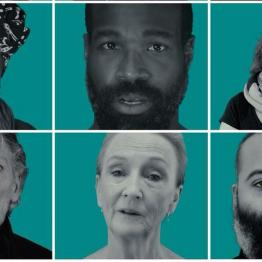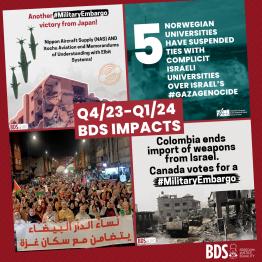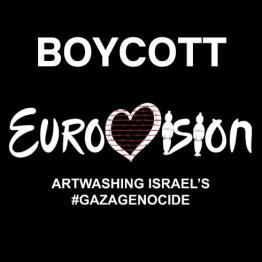Appeal to Jello Biafra: Do not cross our picket line
The Palestinian Campaign for the Academic and Cultural Boycott of Israel (PACBI) sent an appeal to Jello Biafra on 7 June 2011, but its receipt was never acknowledged. In light of the public conversation around Biafra’s performance in Tel Aviv, PACBI has decided to publicize its appeal to him to cancel his ill-conceived show.
We also feel that a recent initiative to document his trip with filmmakers [1] deserves comment. We would encourage Palestinians to refrain from participating in this project unless Jello Biafra cancels his boycott-bashing Israel show and organizes his trip in a private capacity to learn the facts. This documentary is billed as part of the band’s fact-finding tour, but as explained in the letter below, this tour is in no way a fact-finding mission. Jello Biafra is going, first and foremost, to perform in Israel, and any attempt to learn on the side is merely to appease the many critics who have expressed their opinions publicly against Biafra’s ill-conceived decision.
--------------------
Dear Jello Biafra,
We are writing from the Palestinian Campaign for the Academic and Cultural Boycott of Israel (PACBI) upon the suggestion of the Palestine Solidarity Campaign (UK), who have been in touch with you. They had forwarded your thoughtful email to us and we felt it important to communicate with you to explain the position of the Boycott, Divestment and Sanctions (BDS) movement, as well as to share with you how the great majority of Palestinian civil society (which stands solidly behind the BDS Call) [2] views violations of our boycott guidelines as undermining our non-violent, morally-consistent struggle for justice, freedom and equality.
In a nutshell, our position is that if you are unaware of the full implications of your performance, or unaware of the details of the conflict, then it is important for you to cancel your performance first and then try to learn for yourselves. In light of the near consensus support for BDS among Palestinians and Israel’s relentless violations of Palestinian rights, going ahead with the show means you have already taken a position to cross our boycott picket line and lend your support to Israel’s oppression. Furthermore, your media reference to “extremists from both sides” seems to indicate your belief that the colonizers and the colonized should be treated symmetrically. As Archbishop Despond Tutu once said: “If you are neutral in situations of injustice, you have chosen the side of the oppressor.”
A visit in your private capacity that does not implicate you in “choosing the side of the oppressor,” however, may help inform your decision and, consequently, your audiences. To come and perform in violation of our boycott, and then learn on the side, means that you ignore a near consensus among Palestinians against such a performance and allow yourself and your art to be used by Israel to whitewash its violations of human rights and of international law. In all certainty, Israel will use such a performance to show that it is a bastion of culture, music and tolerance, and to cover up its terrible record of human rights abuses. Elvis Costello, the Pixies, The Klaxons, Roger Waters, Gil Scott-Heron, Faithless, Gorillaz, and many others reached this conclusion and opted not to perform in Israel until it respects its obligations under international law. We have outlined some of these positions in a general statement published last month that you might want to read for further clarification [3].
By performing in Israel you may not be announcing support for the far right government of Netanyahu, true; but you would be lending your good name to be used by this government to make it sound like business as usual could go on despite its crimes. Why else did the African National Congress, in its struggle against apartheid, ask all artists to entirely boycott South Africa and not to perform in Sun City, in particular? Some of the artists that violated the South Africa boycott were certainly against apartheid, but by performing there they became complicit in perpetuating apartheid and undermining the struggle to end it. By performing in Israel despite its egregious record of violating human rights and international law, similarly undermines our civil struggle to end these violations and reclaim our rights.
In your email to the PSC, you noted that there is not nearly the unity in the BDS movement as there was in the boycott against apartheid South Africa. We hope you do not consider unity to mean that every single person converges in support of the boycott, as that is not possible to attain in any struggle. Despite the near consensus that exists among Palestinians in support of the boycott, this still leaves some who disagree, and that is normal in any human experience. You must note that there was far less unity in the South African movement when it first started. Moreover, it took almost 20 years till there was any mainstream international response to the South African call for boycott. At the time when there was unity it became an easy position for people to boycott, and soon after the apartheid regime fell. But artists, musicians and many people around the world had to make tough and important sacrifices to bring the movement towards this unity. In the Palestinian case, an international unity is forming at the grassroots level at a much faster pace, in part with the help of our knowledge and lessons of the South African anti-apartheid struggle. On the Palestinian side, the BDS movement has the endorsement of over 170 civil society organizations and wide consensus that makes it pretty much a unified position.
What is also important to keep in mind is that people who want to stand in solidarity should take their reference points from those who are oppressed and not the Israeli left. Palestinians cannot wait for the Israeli left to wake up and give them their freedom. Struggle against colonialism, occupation and apartheid does not work like that, as you must know from the civil rights movement’s struggle in the US and the anti-apartheid struggle in South Africa. There are increasingly more people in Israel who stand with us, such as the Coalition of Women for Peace, Boycott from Within and the Israeli Committee Against House Demolitions, and although you can listen to those partners of ours, we always hope that people will listen to Palestinian voices who are the oppressed in the end. So if the Israeli and Palestinian left are divided then the key is to take note of the Palestinian voices. After all, it does not seem to make sense for us to argue that we would have taken a position to boycott apartheid South Africa only once the white community spoke out in favor. It was black South Africans that people listened to in deciding to boycott, and where it was not, we think you would agree that it should have been the case.
We are not sure who you spoke to on the Palestinian side and what that person might have told you, but on our part, in addition to all the struggles, we are fighting the legacy of the Oslo peace process which brought us years of utterly futile and counterproductive joint Palestinian-Israeli “cooperation,” all the while Israel, with overwhelming public support, expropriated Palestinian land and built more settlements than the entire 30 year period before the peace process. This process found its ways into Palestinian schools and organizations and created a whole industry of peace that tied Palestinian ideas of freedom to fit the agendas of foreign NGOs and narrow Israeli interests and priorities. If you wanted money to operate you had to include an Israeli partner or talk about joint cooperation. This led nowhere, but it did create a generation of Palestinians that are only now trying to shed this dark period and stand their ground together. This is what the BDS movement is about. It is about a solid, non-violent, and just stand in the face of oppression, supported by almost all Palestinian civil society.
You write that you hope your performance will help bring down Israel’s colonial wall. Let us assure you it will hurt the persistent, years-long popular, non-violent struggle against the wall. All the popular committees struggling against the wall are part of the BDS movement and have called on their supporters to respect our boycott guidelines as a means to support their/our struggle. Crossing our boycott picket line will only contribute to Israel’s arrogance of power and impunity.
Please cancel your show and come and learn about the situation first. It seems like the more logical thing to do if one really wants to learn about a situation.
PACBI
Notes:
[1] http://www.kickstarter.com/projects/1614007142/jello-biafra-visits-the-holy-lands-working-title
[2] http://www.bdsmovement.net/call
[3] http://pacbi.org/etemplate.php?id=1582




